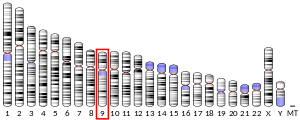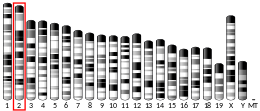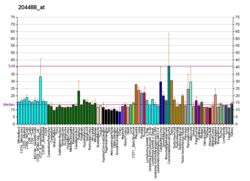Dolichol kinase
| dolichol kinase | |||||||||
|---|---|---|---|---|---|---|---|---|---|
| Identifiers | |||||||||
| EC number | 2.7.1.108 | ||||||||
| CAS number | 71768-07-5 | ||||||||
| Databases | |||||||||
| IntEnz | IntEnz view | ||||||||
| BRENDA | BRENDA entry | ||||||||
| ExPASy | NiceZyme view | ||||||||
| KEGG | KEGG entry | ||||||||
| MetaCyc | metabolic pathway | ||||||||
| PRIAM | profile | ||||||||
| PDB structures | RCSB PDB PDBe PDBsum | ||||||||
| Gene Ontology | AmiGO / QuickGO | ||||||||
| |||||||||
In enzymology, a dolichol kinase (EC 2.7.1.108) is an enzyme that catalyzes the chemical reaction
- CTP + dolichol CDP + dolichyl phosphate
Thus, the two substrates of this enzyme are CTP and dolichol, whereas its two products are CDP and dolichyl phosphate.
This enzyme belongs to the family of transferases, to be specific, those transferring phosphorus-containing groups (phosphotransferases) with an alcohol group as acceptor. The systematic name of this enzyme class is CTP:dolichol O-phosphotransferase. This enzyme is also called dolichol phosphokinase. This enzyme participates in N-glycan biosynthesis.
In humans dolichol kinase is encoded by the DOLK gene.[5][6][7]
Function
Dolichyl monophosphate is an essential glycosyl carrier lipid for C- and O-mannosylation and N-glycosylation of proteins and for biosynthesis of glycosylphosphatidylinositol anchors in endoplasmic reticulum (ER). Dolichol kinase catalyzes CTP-mediated phosphorylation of dolichol, the terminal step in de novo dolichyl monophosphate biosynthesis.[8]
Clinical significance
Mutations in DOLK cause a subtype of the congenital disorders of glycosylation, DOLK-CDG (CDG-Im).[9]
See also
References
- 1 2 3 GRCh38: Ensembl release 89: ENSG00000175283 - Ensembl, May 2017
- 1 2 3 GRCm38: Ensembl release 89: ENSMUSG00000075419 - Ensembl, May 2017
- ↑ "Human PubMed Reference:".
- ↑ "Mouse PubMed Reference:".
- ↑ Clark HF, Gurney AL, Abaya E, Baker K, Baldwin D, Brush J, Chen J, Chow B, Chui C, Crowley C, Currell B, Deuel B, Dowd P, Eaton D, Foster J, Grimaldi C, Gu Q, Hass PE, Heldens S, Huang A, Kim HS, Klimowski L, Jin Y, Johnson S, Lee J, Lewis L, Liao D, Mark M, Robbie E, Sanchez C, Schoenfeld J, Seshagiri S, Simmons L, Singh J, Smith V, Stinson J, Vagts A, Vandlen R, Watanabe C, Wieand D, Woods K, Xie MH, Yansura D, Yi S, Yu G, Yuan J, Zhang M, Zhang Z, Goddard A, Wood WI, Godowski P, Gray A (Oct 2003). "The secreted protein discovery initiative (SPDI), a large-scale effort to identify novel human secreted and transmembrane proteins: a bioinformatics assessment". Genome Res. 13 (10): 2265–70. doi:10.1101/gr.1293003. PMC 403697. PMID 12975309.
- ↑ Shridas P, Waechter CJ (Oct 2006). "Human dolichol kinase, a polytopic endoplasmic reticulum membrane protein with a cytoplasmically oriented CTP-binding site". J Biol Chem. 281 (42): 31696–704. doi:10.1074/jbc.M604087200. PMID 16923818.
- ↑ "Entrez Gene: DOLK dolichol kinase".
- ↑ Fernandez F, Shridas P, Jiang S, Aebi M, Waechter CJ (September 2002). "Expression and characterization of a human cDNA that complements the temperature-sensitive defect in dolichol kinase activity in the yeast sec59-1 mutant: the enzymatic phosphorylation of dolichol and diacylglycerol are catalyzed by separate CTP-mediated kinase activities in Saccharomyces cerevisiae". Glycobiology. 12 (9): 555–62. doi:10.1093/glycob/cwf068. PMID 12213788.
- ↑ Kranz C, Jungeblut C, Denecke J, Erlekotte A, Sohlbach C, Debus V, Kehl HG, Harms E, Reith A, Reichel S, Grobe H, Hammersen G, Schwarzer U, Marquardt T (March 2007). "A defect in dolichol phosphate biosynthesis causes a new inherited disorder with death in early infancy". Am. J. Hum. Genet. 80 (3): 433–40. doi:10.1086/512130. PMC 1821118. PMID 17273964.
Further reading
- Burton WA, Scher MG, Waechter CJ (1979). "Enzymatic phosphorylation of dolichol in central nervous tissue". J. Biol. Chem. 254 (15): 7129&ndash, 36. PMID 457672.
- Rip JW, Carroll KK (1980). "Properties of a dolichol phosphokinase activity associated with rat liver microsomes". Can. J. Biochem. 58 (10): 1051&ndash, 6. doi:10.1139/o80-142. PMID 6257336.
- Kranz C, Jungeblut C, Denecke J, et al. (2007). "A defect in dolichol phosphate biosynthesis causes a new inherited disorder with death in early infancy". Am. J. Hum. Genet. 80 (3): 433–40. doi:10.1086/512130. PMC 1821118. PMID 17273964.
- Gerhard DS, Wagner L, Feingold EA, et al. (2004). "The status, quality, and expansion of the NIH full-length cDNA project: the Mammalian Gene Collection (MGC)". Genome Res. 14 (10B): 2121–7. doi:10.1101/gr.2596504. PMC 528928. PMID 15489334.
- Humphray SJ, Oliver K, Hunt AR, et al. (2004). "DNA sequence and analysis of human chromosome 9". Nature. 429 (6990): 369–74. doi:10.1038/nature02465. PMC 2734081. PMID 15164053.
- Strausberg RL, Feingold EA, Grouse LH, et al. (2003). "Generation and initial analysis of more than 15,000 full-length human and mouse cDNA sequences". Proc. Natl. Acad. Sci. U.S.A. 99 (26): 16899–903. doi:10.1073/pnas.242603899. PMC 139241. PMID 12477932.
- Kikuno R, Nagase T, Ishikawa K, et al. (1999). "Prediction of the coding sequences of unidentified human genes. XIV. The complete sequences of 100 new cDNA clones from brain which code for large proteins in vitro". DNA Res. 6 (3): 197–205. doi:10.1093/dnares/6.3.197. PMID 10470851.
External links




